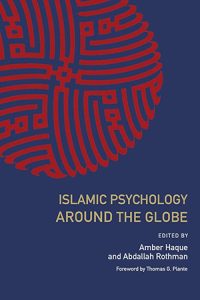Islamic Psychology Around the Globe

Editor(s): Amber Haque & Abdallah Rothman
Publisher: International Association of Islamic Psychology
Year of Publication: 2021
Print Length: 376 pages
Genre: Islamic Studies / Science, Dawah & Applied Science, History; Non-Fiction / Psychology, History, Religious Studies, Social Science
Area: Australia, Bosnia and Herzegovina, Egypt, India, Indonesia, Iran, Saudi Arabia, Malaysia, Nigeria, Pakistan, Somalia, South Africa, Sudan, Turkey/Turkiye, The United Kingdom (UK), The United States of America (USA), West Europe
Topic: History, Islam, Muslim, Muslim World, Psychology, Psychosocial, Religion, Spirituality, Therapy, Wellbeing, Local & Global, Challenges & Opportunities, Future Scenarios
Islamic Psychology (IP) is an emerging discipline evident from a consistent growth of publications worldwide in the last 40 years. While the body of knowledge and practice is not new and was known as Ilm an-Nafs or science of the self during the Islamic Golden Age, it lost its significance for many centuries primarily because of the secularization of psychology and colonization of the Muslim world. IP has now developed into a professional and academic field, as it tries to understand the human self from an Islamic worldview. This book examines IP development in 17 countries ranging from Indonesia to Bosnia to the United States. A bird’s eye view of the discipline’s growth, as offered across the chapters in this book, can help the reader understand the history, challenges, and prospects of this developing field and illuminate for the broader field of psychology how the Islamic tradition has been integrated into mental health practices in Muslim communities. The book broadens the reach of modern psychology by exploring spirituality and religion in the Muslim world.
Table of Contents
Foreword
Acknowledgments
Introduction — Abdallah Rothman and Amber Haque
1. Islamic Psychology in Australia: An Emerging Field — Hanan Dover
2. Islamic Psychology from Bosnian Perspectives: Experiences and Contributions of Muslim Psychologists and Thinkers — Aid Smajić and Selvira Draganović
3. The Journey of Islamic Psychology in Egypt: The Case of Muhammad ‘Uthman Nagati (1914-2000) — Khalid Elzamzamy, Roaa Moustafa Ahmed, Walid Hassan and Mohamed El Mahdi
4. Islamic Perspectives of Psychology in India — Akbar Hussain
5. Islamic Psychology in Indonesia: History and Research Priorities — Diana Setiyawati and Bagus Riyono
6. Islamic Psychology in Iran: Past, Present, & Future — Hamid Rafiei Honar and Masood Azarbayejani
7. Islamic Rooting of Psychology in the Kingdom of Saudi Arabia — Saleh bin Ibrahim Al-Sanie
8. The Establishment and Growth of Islamic Psychology in Malaysia — Alizi Alias
9. Islamic Psychology in Nigeria: An Overview of Accomplishments, Challenges and Prospects — Salisu Shehu
10. A Journey from Muslim Psychology to Islamic Psychology in Pakistan — Tamkeen Saleem and Muhammad Tahir Khalily
11. Islamic Teaching-Informed Psychology and the Somali People: Current Practices and Future Directions — Jibril I.M. Handuleh, Abdikani Askar and Abdilahi E. Momin
12. The Direct and Indirect Developments of Islamic Psychology in South Africa — Juraida Latif and Shaakirah D. Boda
13. Development and Characteristics of Islamic Psychology in Sudan — Ahmed Mohammed Al-Hassan Al-Awad Shennan
14. Studies on Islamic Psychology in Turkey: Present Situations, Possibilities, and Challenges — Suleyman Derin and Taha B. Toprak
15. The Development of Islamic Psychology in the United Kingdom — Rasjid Skinner
16. Islamic Psychology in the United States: Past, Present, and Future Trajectory — Carrie York Al-Karam
17. Islamic Psychology in Western Continental Europe: A Top-Down Approach — Paul M. Kaplick, Amin Loucif, & Ibrahim Rüschoff
Notes on Contributors

Amber Haque earned his PhD in Psychology from Western Michigan University and Master of Science in Clinical Psychology from Eastern Michigan University. He worked as a psychologist for various mental health institutions in the US (Michigan and NY State) for over 12 years and then switched to academia in 1996. Dr. Haque taught in the Department of Psychology, International Islamic University Malaysia (IIUM) for eight years and Department of Psychology, UAE University (UAEU), UAE for 14 years. He also served as Visiting Professor at National University of Malaysia (UKM), International University of Sarajevo (Bosnia) and Visiting Scholar at Cornell University (Ithaca) and University of Pennsylvania (Philadelphia). Dr. Haque is currently Professor in Clinical Psychology at the School of Psychology and Social Work, Doha Institute for Graduate Studies, Qatar.
Source: https://muslimmentalhealth.psychiatry.msu.edu/researchers/amber-haque-phd
More from Amber Haque in this library, click here.

Abdallah Rothman is the founder of Dar al-Shifaa and co-founder and Executive Director of the International Association of Islamic Psychology, working at the intersection of Islamic spirituality and mental health practice. He is a Licensed Professional Counselor (LPC) and a Board Certified Registered Art Therapist (ATR-BC), licensed in the United States and currently living abroad in the UAE. He earned an M.A. in Psychology from Antioch University and earned his Ph.D. in Psychology from Kingston University London. He is a student of Professor Malik Badri in Islamic psychology and in addition to his academic training has studied privately with a number of traditional Islamic scholars throughout the Muslim world. His clinical practice as well as his academic research focus on approaching counseling from within an Islamic paradigm and establishing an indigenous theoretical orientation to human psychology that is grounded in the knowledge of the soul from the Islamic tradition. Currently, he is the Head of Islamic Psychology of Cambridge Muslim College.
Source: https://www.cambridgemuslimcollege.ac.uk/aer/
More from Abdallah Rothman in this library, click here.
